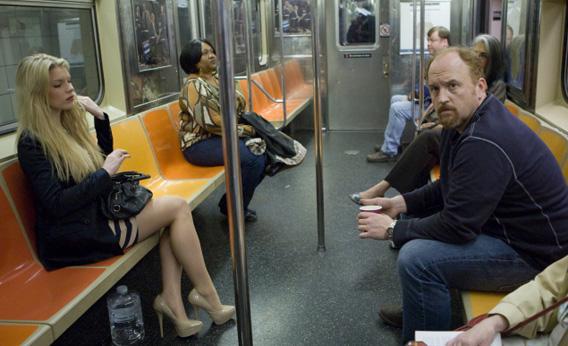Read Slate’s “TV Club” on the new season of Louie.
The third episode of the third season of Louie (FX, Thursdays at 10:30 p.m. ET) takes our hero—the comedian Louis C.K., playing a version of his single-dad self—from his Manhattan habitat to Miami. On the beach, paler than the sand, he flounders like a fish out of water, disgusted by the vanity on parade. In the ocean, he flails fatly when trying to wave off the hotel employee collecting the towel in which his wallet is wrapped. A lifeguard interprets his heaving gestures as a cry for help and hauls him back to shore. They get to chatting, and when the hero tells the lifeguard that he’s doing stand-up in the hotel lounge, the guy asks, “Are you funny?”
Tough question. Louis is, but Louie isn’t, which is a matter of this season’s risky and rewarding design. At the outset, this show aimed for hilarity and hit the mark, consistently and cathartically, while also trafficking in provocative sidewalk philosophy, achieving moral seriousness amid masturbation jokes. It returns in a minor key. Even the most explicitly comic and comically explicit moment found among the five new episodes I watched—a sequence where C.K. hooks up with an aggressively bawdy Melissa Leo—is shot through with melancholy. The man is glum, and he’s searching for a connection. Is he pursuing love or just chasing away loneliness? In one of the snippets of comedy club stand-up that punctuate the main action, he demonstrates for his audience the victorious gesture he still makes when a woman agrees to go on a date. “That tennis player’s thing,” he calls it, trembling a triumphant arm. “Only tennis and golf players do that fist-pump thing, and it’s because they’re alone.”
In the first episode, titled “Something Is Wrong,” C.K. tries to break up with the woman he’s been seeing, but he cannot. For one thing, he’s in a funk of passivity and mute hesitation. (“What is this? A game of relationship charades?” she asks, from the other side of a booth in a diner while he digs his spoon into his regressive bowl of ice cream.) For another, well, she hasn’t even met his kids, so the situation calls more for falling apart than for an active breaking up, doesn’t it? For a third thing, there’s the first thing: “This is amazing. You’re gonna make me break up with myself!” He leaves the diner, and out on the street, a backhoe is casually totaling his car. Is it funny? Yes, like Samuel Beckett.
Later—at leisurely length and a slightly stilted height of tone—the character romances a bookstore clerk (Parker Posey). The creator again floats the ambient question of whether he’s trying to get the girl or to get away from himself, and the vignettes get to look like outtakes from a downbeat art-house romance. And the Miami lifeguard? The two hit it off. After an exuberant day of palling around town, Louie falls for the guy so hard that he extends his visit, which leads to a fantastic scene of his stammering to explain himself as a heterosexual overcome with a homo-social crush. It’s an articulate social observation, funny-awkward, delivered by a man who, having met with great success in reconfiguring the sitcom’s formal limits, is testing its tonal range with impressive confidence.
Louie is now joined on FX’s lineup by Anger Management (Thursdays at 9 p.m. ET), which is no less experimental: It represents the network taking an unprecedented detour to one of the crummier quarters of Squaresville, and it inherently tests the willingness of completion guarantors to insure Charlie Sheen. A year after the makers of Two and a Half Men ceased to tolerate Sheen’s flagrant degeneracy, he has returned to series television, more or less stunt-cast to type as a recovering rageaholic. Tagline: “A hostile makeover.” Sheen plays Charlie Goodson, who years ago ended a promising baseball career with a physically self-destructive tantrum, then studied psychology and became an anger-management therapist. Goodson has an ex-wife, a teenage daughter, and a friend-with-benefits played by Selma Blair. On the production side, top billing goes to guys who were behind The Drew Carey Show and The George Lopez Show. They have failed to uphold their usual high standards, having not mastered the calculus of delivering the boorishness for which Sheen loyalists thirst while simultaneously tinkering with themes of redemption.
Goodson does a bit of work with inmates, but that’s just for the sake of effecting jokes about prison sex. His bread-and-butter is hosting group therapy sessions in his living room, where the patients include a gay personal shopper and a Vietnam vet. (Naturally, the existence of the gay guy arouses the slurs of the aged warrior, who atones by stuffing dollar bills in “the ‘queer’ jar.”) There is also a woman who, judging strictly by the brevity of her shorts and the translucency of her blouse, would seem to be on loan from Bad Girls Club or some such weave-pulling reality show. In fact, she has been ordered to attend therapy after shooting her cheating boyfriend in “the balls,” a term that never fails to get a rise out of the laugh track. I’m open to the idea that the existence of Anger Management is the very thing that’s making Louie so wonderfully sad.
